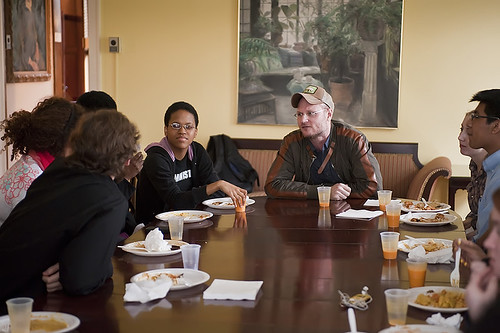Augusten Burroughs, who chronicled his unusual childhood in his 2002 memoir Running with Scissors, delivered a candid keynote address at Colgate’s fifth annual Big Gay Weekend.
His messages ranged from developing inner strength (“What you need is not more confidence, you need to subtract whatever it is that prevents confidence, and that is caring too much about what other people think”), to the inevitability of legalized gay marriage (“There will be a day when you will hold today’s discrimination in the palm of your hand, like a charming memento”).
While Burroughs considered himself to be an unlikely special guest — because he “never had a moment where he ‘came out’ to anything” — his message on Friday gave members and supporters of Colgate’s Lesbian, Gay, Bisexual, Transgender, and Questioning (LGBTQ) community a lot to talk about.
 |
| Author Augusten Burroughs meets with students at Merrill House before delivering his public lecture. (Photo by Andy Daddio) |
“In that environment, my sexuality was not an issue,” he said. “I didn’t ever think about being gay. It was like being right-handed. Why? I don’t know. I just am.”
The theme of the weekend was “Be Yourself.”
About that, Burroughs said: “I wish I could take forensic evidence out of my brain and stick it in yours so you would know that that’s all you have to be. That’s everything you have to be.”
But things aren’t always that simple, said Aleksander Sklyar ’10. “It makes me happy to know that there are individuals out there, like Augusten, who did not have to go through the pain and difficulty of ‘coming out.’ However, for many in the LGTBQ community, me included, being ourselves is anything but simple; the process to self-acceptance and self-assertion was anything but an easy one for me.”